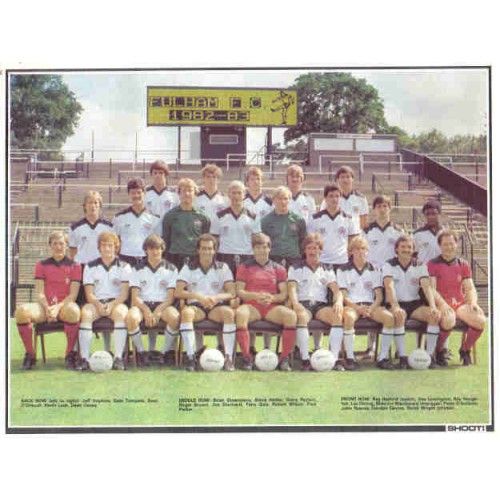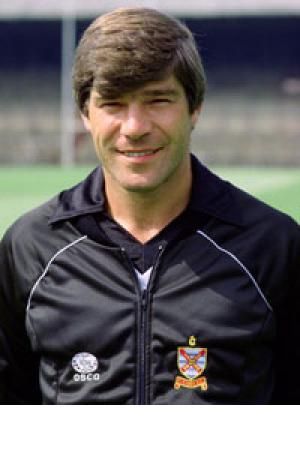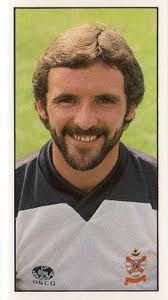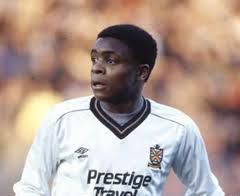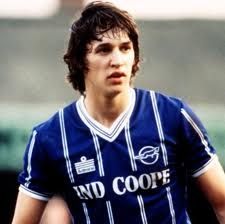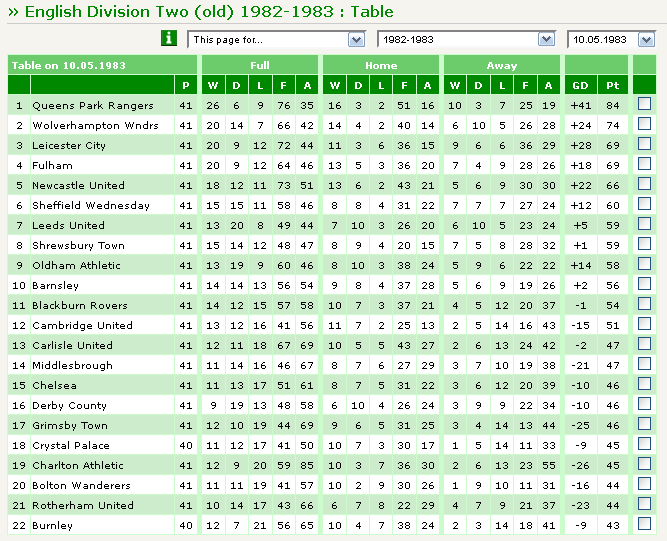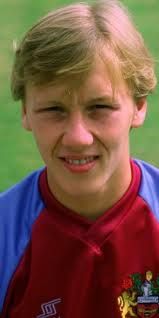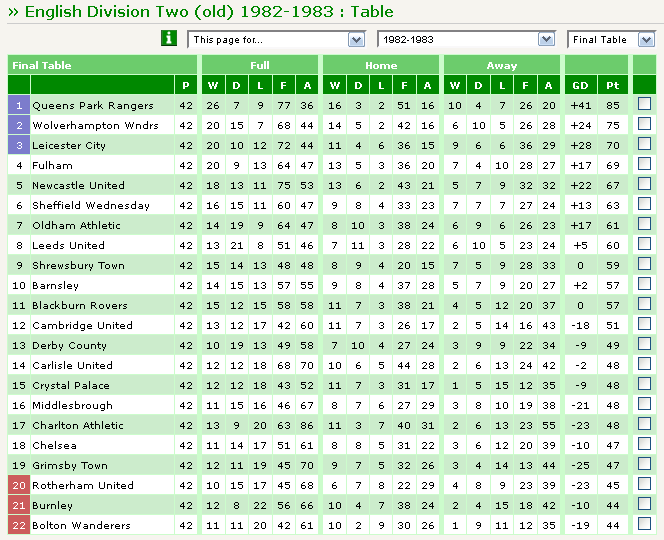This is the story of Mansfield Town’s glory years of the mid-to-late 1970’s. So far we have seen them win Division’s Four and Three in three seasons. They were then into the Second Division for the first time in their history. But they were finding the going tough. At the end of 1977 they were in the relegation zone, two points from safety with 19 matches to play.
1978
January
They began the year with a trip to Stoke City, who provided them with their first ever win in Second Division football. A 1-1 draw saw two unlikely scorers in Jim McGroarty and David Goodwin getting their firsts of the season for their new clubs. The biggest shock of the day came at Burnden Park, where leaders Bolton were beaten by bottom club, Burnley.
Mansfield now had experienced one of the perks of being a Second Division club. They didn’t enter the FA Cup until the Third Round in January. They were drawn at home to Third Division Plymouth Argyle, then managed by Malcolm Allison.
Johnny Miller’s first half strike proved to be the only goal of the game and Stags’ fans had a glimmer of hope for another cup run.
Southampton then visited and were in great form, picking up nine points from a possible 10 in their previous five matches. They were in the promotion places too. Alan Ball scored from the spot to give them the lead. Syrett ended a four game streak without a goal to level things up. But then Ted MacDougall put the visitors back in front and the Stags were never able to get back level.
Four defeats in their last five home matches wasn’t the form of survival. Burnley followed their win at Bolton with a home win over Stoke and were now level on points with Mansfield.
They then travelled down to the south coast to take on Brighton. The Goldstone Ground was a place Mansfield hadn’t even got so much as a point at for nearly eight years. The Seagulls were fifth in the table and pushing for a second successive promotion. But they had only won one of their last five so the Stags had reason to be positive. That was until the action got underway.
Goals from Peter Ward (2) and Teddy Maybank gave the home side a comfortable 3-0 lead at the break. Ward then completed his hat-trick in the second half, with skipper Brian Horton also finding the net. Mansfield did get a goal but it was courtesy of Peter O’Sullivan putting through his own net and they suffered the ignominy of losing 1-5 with the home team scoring all the goals.
This was a bad defeat, they were well beaten and looked short of confidence. Burnley drew 3-3 with Southampton and then moved above the Stags who were then second from bottom.
February
If the fans hoped the FA Cup could provide some relief from their league woes. But a first half goal from Frank Worthington gave Bolton the win in the Fourth Round and now their cup run dreams were gone.
But they had already finished their fixtures against three of the top seven so hopefully there were easier games to come.
Cardiff arrived in 19th, but off the back of a 5-2 drubbing of Sunderland. Perhaps it was little surprise when Bishop and Buchanan scored for the visitors in the first half. Ian Wood finally ended his 39-game search for his first league goal of his career and the home side went in just a goal down. It was the sort of game where the next goal would be crucial. Fortunately for the home side Hodgson got it, his first for five months. A 2-2 draw gave them a crucial point, especially as Millwall beat Southampton. Mansfield were now rock bottom, with Millwall above them on goal difference and with a game in hand.
Peter Morris selected himself in the starting line-up for the first time since the Blackpool home match in early December. After the match the fans discovered it was more to say goodbye than to offer anything on the playing side. Morris was off to take over the Assistant Manager job at Newcastle United.
What were they going to do now?
The board searched around for his successor and came up with former Everton and Northern Ireland manager, Billy Bingham. There were hopes his stature in the game could attract some top quality names to the club which would go on to cement their Second Division status.
The latest winless run was at six. More alarmingly they’d won just one of their last 12. Mind you, their next visitors, Hull City had a similar record. They were fourth from bottom and three points ahead of the Stags. 7,121 watched nervously as Colin Foster put the home side in front. The home side clung on too and Mansfield moved up two places. Could they build on this?
March
The short answer was no. They lost their next five. Defeat at Sheffield United was followed by another home loss to Bolton. Neither match had seen them score. For Syrett the goals had dried up after his promising start to the season. He’d found the net six times in his first 15 games. His next 13 had yielded just two goals.
Bingham dipped into the transfer market and brought in Dennis Martin from Newcastle. He’d played nine times that season for the Magpies in Division One. He was thrown straight into the first team in the defeat to Bolton.
Mid-March saw them travel to Burnley for a crucial relegation battle. The phrase didn’t exist back then but if it had this would definitely have been a ‘relegation four pointer’.
Burnley were two places and three points above Mansfield, who were bottom of the table. The Clarets had really turned their form around. When they lost to Oldham the day after Boxing Day, they were rock bottom with just 12 points. They’d only suffered one defeat in the nine matches since then, picking up 11 points. In comparison Mansfield had picked up just four points over the same period. They were also coming off the back of a 4-1 win over Sheffield United, a week after Mansfield had been beaten by them, 0-2.
Paul Fletcher gave the home side a first half lead. Aston, who had missed the Bolton defeat, came on as a sub for Syrett but he couldn’t find the net. Steve Kindon confirmed the victory for Burnley, who moved up to 18th. This was three games now where Mansfield had failed to find the net, and the gap to safety was four points. More worrying there were only 11 games left.
Back-to-back 0-1 defeats to Sunderland and Notts County followed, taking their losing streak to five. They hadn’t scored in any of those, either.
It was against this backdrop the leaders arrived on Easter Saturday. In happier times this may have meant a big crowd. But it was a measure of the inertia around the town that Tottenham Hotspur only attracted a crowd of 12,106, fewer than the opening day game against Stoke City. In fact, more people turned up to see Notts County in late October than a club who were still labelled as one of ‘the big five’.
Spurs had won three on the bounce and were unbeaten in their last 17. It was a daunting task, and the ultimate David v Goliath with first taking on last.
Despite the slightly disappointing attendance the atmosphere was of ‘cup tie’ standards. Mansfield seemed to lift themselves and certainly took the game to their more illustrious opponents. It was during a period of pressure they took the lead on 28 minutes.
Bird’s cross from the right down near the bye-line was floated to the far post where Martin got up above two defenders. He headed it back across the six-yard area and Syrett was there to turn it past Daines. It was a great moment for the Mansfield number nine. It was his 10th of the season and it ended an eight-game run since his last goal.
In pouring rain and on a muddy pitch, Spurs levelled. Hoddle produced a lovely cross from a tight angle on the right. Arnold went up with Lee to try and catch it, and although he got his hands to it he was unable to hold onto it. It rolled clear for Pratt to strike it, but Arnold saved it but once again couldn’t get a decent grip on the ball. Lee rolled it to Pratt, who had another go and again the keeper was equal to it. But unfortunately for him the nearest player to him was Chris Jones and he gleefully accepted the opportunity to put it in the net.
The home side weren’t deterred and some decent passing in awful conditions, saw Martin head on Miller’s ball into the area. He found Hodgson on the right of the box and as he beat Perryman, the Spurs skipper tripped him. The referee had no hesitation in pointing to the spot. Dennis Martin was given the opportunity to score his first goal for the club. But his kick was what is normally described as a ‘good height for the keeper’ and Daines saved it.
With three minutes of the first half to go, Mansfield had a corner on the right. Hodgson took it left-footed and Colin Foster got up above everyone to head it goalwards. Syrett was then able to nod it on past Daines and Neil McNab cleared it off the line. The home side and their fans called it over the line, the visitors had other ideas. But the officials ruled it in and Mansfield went into the break 2-1 up.
That’s how things remained until the final 10 minutes as Spurs had appeals for a penalty. Jimmy Holmes corner on the left was headed towards goal by Lee and found Taylor with his back to goal on the far post. He turned and hit a shot across the goal which appeared to strike Wood on the hand. The Spurs players protested and the referee gave the penalty. Mansfield players were incensed as they felt Taylor controlled the ball with his arm before turning to hit his shot. Replays suggested he did.
Hoddle took the kick and easily beat Arnold to level the scores.
Within minutes the home side struck back. Perryman gave the ball away to Hodgson in midfield. He immediately launched it forward for Syrett to run onto. But he overhit the pass and Daines came out of his area to clear. Inexplicably, the hapless keeper missed his kick and Syrett couldn’t believe his luck as he ran on and passed the ball into the empty net. There was a brief moment when it almost looked like the mud would hold the ball up, but it just rolled over the line. It was Syrett’s hat-trick and they were on the verge of a famous win.
They then should’ve put the game beyond reach. Another in-swinging corner from Hodgson was headed on at the near post by Syrett. All of a sudden Colin Foster had made a run to the far post and was unmarked. But with the goal at his mercy, he lunged at the ball and it went agonisingly wide.
Spurs were then awarded a free-kick right on the edge of Mansfield’s area as the clock ticked towards 90 minutes. It was very likely to be the final chance of the match. Hoddle took it and chipped it over the wall and into the top corner. It was a brilliant moment from a player still in the ‘promising’ category, who would go on to do that sort of thing for fun.
The game ended 3-3. Mansfield could have reason to feel they should’ve won, as Spurs shouldn’t really have had a penalty for 2-2. But the point was an important one and well earned. Above them both Millwall and Hull drew, so this was vital to stay in touch.
It had been a really entertaining game and was one of five games that day which saw five goals or more.
On Easter Monday Syrett was again on target and so was Colin Foster as they went to Fulham and won 2-0. Their first win for six matches and after five matches without a goal they’d scored five in two.
Seven games to go they were still bottom, and five points adrift of Cardiff who were just outside the relegation zone, with two games in hand. One of those came two days later as they shocked third placed Southampton with a 1-0 win. The gap to safety remained at five points but now Orient were the target and they too had two games in hand.
April
The joy of an uptick in form through the Easter period was short lived as Charlton came to Field Mill and walked away with a convincing 3-0 win. At least Millwall and Orient both lost.
Midweek saw Orient pick up a point so when Mansfield went to Oldham and won thanks to a Johnny Miller goal, this gave some relief. It was only Oldham’s second home defeat of the season. But the four clubs above them all picked up points too.
Blackburn were the visitors next, lying in fifth with their promotion hopes hanging by a thread with one win in their last seven. Syrett put the home side in front. Tony Parkes levelled in the second half, but then Mansfield had another penalty. This time Syrett took it and made no mistake. But they couldn’t hold onto the lead and Dave Wagstaffe equalised to share the points.
Hull and Orient both lost but Millwall won. Mansfield were now three points from safety but games were running out.
In the week Millwall and Orient both won and Mansfield were now five points from safety with just four games to go.
Mansfield were then at Blackpool. The Tangerines’ form was worse than Mansfield’s. In mid-March they were seventh. But no win in their last eight saw them slide dangerously down the table. Bob Hatton scored his 21st of the season to give the home side the lead but this was cancelled out by Miller. In the second half Mansfield had yet another penalty and again Syrett was successful. Another vital away win for the Stags, their third in succession.
With Orient beating Hull City, Mansfield knew they had to win all of their final three matches to stay up. Even then Orient still had a game in hand.
Mansfield were in action next. Bristol Rovers arrived in 17th and not completely safe. As if to sense their opportunity, Miller and Aston gave them breathing space at the break. Aston added his second and Mansfield’s third to round off a wonderful 3-0 win. Their first time they’d registered back-to-back wins since the beginning of October. It also took them off the bottom of the table since the end of January.
24 hours later all eyes were on Brisbane Road where Orient took on Southampton. The Saints arrived top of the table. Tony Funnell gave them the lead but Joe Mayo equalised and earned the O’s a crucial point.
Mansfield now needed snookers.
Even winning their final two matches might not be enough, unless a swing in goal difference could see them overcome the eight goals they were behind Millwall.
Remarkably for all concerned the fixture schedule had thrown up a huge game as Mansfield entertained Orient at Field Mill. This was probably a blessing for the visitors as they could at least influence their own chances of staying up, rather than rely on others. Mansfield could afford nothing but a win, and really needed a convincing one.
16 minutes in and the home fans got their wish. A free-kick move was finished off by Sandy Pate. It was a great moment for the, then, club’s record appearance holder. It was only his second ever league goal for the club he first turned out for in September 1968. His first was in April 1976. Now two years later could he help keep the club up?
Pate was only making his ninth appearance of the season. The days of him being a regular were past him. Incredibly between September 1968 and August 1975 he played 366 consecutive matches, and was ever-present in six consecutive seasons.
Try as they might they just couldn’t add to this. A win was vital but a 1-0 win was hardly of much use, as they needed more goals. Their first half performance was such the home fans gave them a standing ovation at the break. In the second half Arnold pulled off a fine save from Kitchen’s fierce striker but the rebound fell to Joe Mayo and he equalised.
At the end Orient’s keeper, John Jackson pulled off a terrific save from Miller which could’ve won it for the home side and threatened the visitors’ survival. But it wasn’t to be.
It ended 1-1, and with it went Mansfield’s Second Division soirée. It had lasted just nine months. Relegation had seemed inevitable for the last few weeks as they desperately tried to stave it off.
It was somewhat fitting Pate scored the last Second Division goal at Field Mill for Mansfield. The CHAD was fairly definite at where the problems lay for the club;
“Injudicious transfer deals, a spate of injuries, and the inability to attract the type of experienced player, so necessary in the higher division, have all played their part in their demise.”
The Stags final Second Division match was a trip to Millwall. A few weeks before it was thought the final two matches of the season could be a suspense-filled relegation battle, against Orient and Millwall. But Millwall’s form towards the end of the season had taken them clear of the drop. They had won their last five matches. John Seasman’s first half goal made it six in a row.
Mansfield limped out of the second tier lacking the fight many had hoped they could muster. However, they had shown some glimpses of being able to compete at that level. They weren’t outclassed in too many matches, they beat the eventual champions, Bolton, as well as the team which ended in second place, Southampton. Plus, of course they were just minutes from beating Tottenham, who also went up.
They were the only plus points at home. Field Mill had become a fortress over the previous couple of seasons, but at the higher level they only won six home games, losing nine.
Bingham had not had the effect on the players or the club many had hoped for. The team’s record under him was P 15, W 5, D 3 L 7.
Dave Syrett had proved a good acquisition with 16 goals. But he missed his strike partner from the previous season, Ernie Moss, who was only able to make 15 appearances before a knee injury kept him out. You can’t blame many a fan who wondered how the likes of Ray Clarke or Kevin Randall may have got on.
It had been a remarkable climb from fourth tier to second in three seasons. But that’s as good as it ever got for the club. They have never reached such heights again.
They finished three places above the drop in Division Three the following season, but a year later couldn’t stave off another relegation. Bingham left the club in summer 1979. Mick Jones took over but couldn’t stop the rot.
August 1980 they were back where this whole story started in August 1975, playing Fourth Division football.
There were several things which struck me about this story when I was researching it. If you were looking into a story about a club which went from Fourth Division to Second in three years you would expect to see a sudden injection of cash, or a big name manager with a new philosophy. Dave Smith was a gamble, it was his first managerial appointment. He won the Fourth Division in only his second season, then had a really impressive second half of the following season in the third, then left.
A new guy took over, also his first managerial appointment, and they won the Third Division. They beat their transfer record by selling two of their best players, hardly spent any of the money, yet it didn’t seem to affect their progress. That was until they reached the Second Division and found their team was still largely the same as had been in the Fourth Division, and the lack of experience and ability just showed them up during a long season.
The fall was as quick as the rise had been. Two promotions in three years was followed by two relegations in three years and they were back where they started. They’ve never reached the heights of the second tier of English football again, and in 2008 they fell out of the league altogether.
For a short period in their long history they were at least mixing it with the big boys. Seems a shame they couldn’t keep it going.
All pics courtesy of Stagsnet & the Chad














